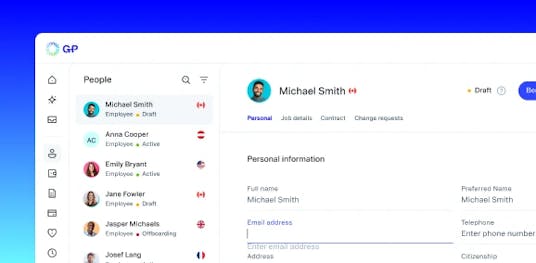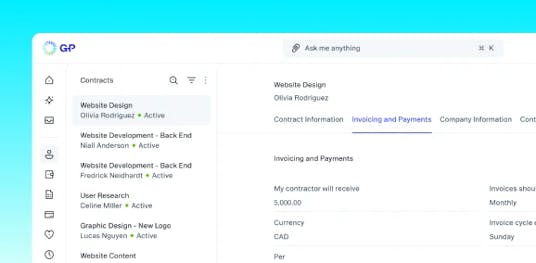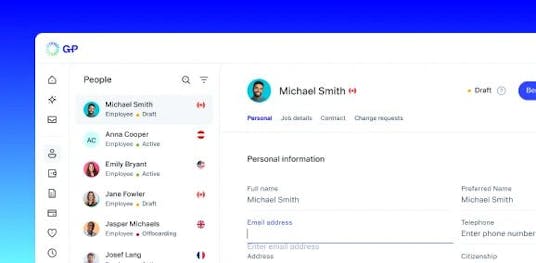Italy is a member of the European Union. Its geographical location makes it a great hub for trade and logistics, especially to Southern Europe, North Africa, and the Middle East.
Before hiring employees or independent contractors in Italy, you’ll need a solid understanding of contracts, taxes, wages, benefits, and other employment considerations. Our guide will tell you everything you need to know about hiring in Italy.

What to know before hiring employees in Italy
If you’re expanding your business into Italy for the first time, there are important legal requirements to be aware of. These norms and laws influence hiring practices in Italy and many aspects of the employer-employee relationship, including compensation and benefits.
G-P Gia™, our AI-powered global HR agent, can answer your toughest compliance questions across 50 countries — including Italy — and all 50 U.S. states. Reduce your reliance on outside counsel and cut the time and cost of compliance by up to 95% with Gia.
Here are five things to know about hiring in Italy.
1. Languages
Italy’s official language is Italian. Italian is used for most business communications, contracts, official documents, and day-to-day operations. English is the second most spoken language in the country. While English is increasingly used in multinational companies and in certain sectors like finance, technology, and tourism, Italian is essential for business dealings, compliance, and integration into the local market.
If Italian isn’t your first language, you can use Gia to draft contracts and other HR documents in Italian. Easily manage global HR processes and employee needs without the hassle of translation or localization.
2. Italian employment trends
The employment rate in Italy is around 62.9%. Unemployment is 4.9%, but the rate is higher in the southern regions like Campania, Calabria, and Sicily. Youth unemployment remains high at about 21.6%. Italy has the lowest employment of university graduates in the EU.
The Italian labor market has a high number of self-employed workers or workers with nonstandard jobs (e.g. part-time workers or on-call workers with no fixed hours). This can be an opportunity for companies looking to hire contractors in Italy.
3. Collective Bargaining Agreements (CBAs) and contracts in Italy
Italy doesn’t have a statutory minimum wage. About 95% of workers are covered by National Collective Bargaining Agreements (CCNL). CCNLs set sector-specific minimum wages, working hours, and employment conditions. Employers have to comply with the relevant CCNL for their sector.
Written employment contracts are mandatory and should outline job duties, salary, working hours, duration, and termination conditions. Contracts don’t have to be in Italian, but if a contract is drafted in another language, an Italian translation may be required for official purposes. Contracts have to align with CCNL provisions and be submitted to the Centro per l’Impiego (public employment office) before the employee starts work.
Fixed-term contracts are limited to 24 months. If you want to extend a fixed-term contract, you must follow special procedures. Noncompliance with contracts can lead to penalties, including business suspension.
G-P EOR has an Employment Contact Generator to help you draft compliant employment contracts that meet all legal needs and best practices in Italy.
4. The workweek and time off in Italy
Statutory law and CCNLs govern working hours and time-off entitlements. The average workweek is 40 hours, spread over five or six days, depending on the sector and company policy.
Overtime can’t exceed eight hours a week or 250 hours a year, unless otherwise specified by the relevant CCNL. Overtime is paid at premium rates. Employees get a minimum daily rest period of 11 consecutive hours every 24 hours, and at least one full day of rest per week (typically Sunday).
Employees get a minimum of four weeks (20 working days) of paid annual leave per year. Many CCNLs give extra vacation days. Italy has 12 national public holidays, and some regions or municipalities have more. Employees are entitled to paid time off on these days.
You can easily administer benefits plans with G-P EOR. Our in-house experts continuously monitor employment laws to meet country-specific regulations and norms. Build and manage benefits plans through our platform to provide a smooth employee experience.
5. Italy employment taxes and social security
Employees are subject to a progressive personal income tax (IRPEF). Rates range from 23–43%, depending on income brackets. Extra regional and municipal expenses range from 1.2–3.3%. Municipal surcharges can add up to 0.9%. Employers withhold this tax from employees’ salaries.
Both employers and employees contribute to Italy’s social security system. This funds pensions, unemployment, sickness, maternity, and other welfare benefits. The total social security contribution rate ranges from 30–33% of gross salary. The employer pays the larger share, around 24–28%. The employee pays the rest. The exact rates vary by sector, company size, and employee classification.
Top hiring hubs in Italy
Some cities in Italy are known for particular industries. Knowing what each city has to offer allows you to focus your hiring efforts in the right place and fill roles faster.
The top talent hubs in Italy are:
-
Milan is Italy's financial and business capital. It’s home to the Borsa Italiana (Italian Stock Exchange), 121 banking institutes, and thousands of brokerage companies. The city is also a global fashion and design capital. Renowned brands like Gucci, Prada, and Armani have operations here.
-
Rome is the capital and a major center for government, public administration, and tourism. International organizations such as the Food and Agriculture Organization (FAO), the World Food Programme (WFP), and the International Fund for Agricultural Development (IFAD), are located here. Life science companies like Eli Lilly, Pfizer, and GlaxoSmithKline are also based in Rome.
-
Turin is known for its automotive, engineering, and aerospace industries. Turin is much more affordable than Milan and Rome. Median rent prices can be as much as 38.5% lower than in Rome.
-
Bologna is home to a Packaging Valley that produces high-tech packaging machinery. It’s also known as Motor Valley as it houses famous brands like Ducati, Lamborghini, and Maserati. The University of Bologna is one of the country’s oldest universities and provides a supply of emerging talent.
-
Florence is known for its art, culture, and history. It has a manufacturing presence, mainly in textiles, pharmaceuticals, and machinery. Florence is considered one of Italy's more expensive cities.
Key industries in Italy
Understanding Italy’s main industries allows you to benchmark salaries and benefits. You can use this insight to make smart choices about where to invest and grow your workforce.
The main industries in Italy include:
-
Automotive: Italy is a big producer and exporter of specialized machinery. The country is home to car brands such as Ferrari, Fiat, Alfa Romeo, Lamborghini, and Maserati. Specialist talent includes car designers, various engineering roles, and automation professionals.
-
Fashion: Italy is a global leader in fashion, luxury goods, and design. Major brands like Versace, Armani, Gucci, and Prada are headquartered in the country. Specialist talent includes designers, master artisans, and marketing professionals.
-
Food and beverage: Italy is a leading producer of food products, including wine, olive oil, cheese, and pasta. It has universities and specialized culinary and hospitality schools dedicated to training skilled professionals. Specialist talent includes food technologists, agronomists, and wine export specialists.
-
Chemicals: Italy is the third-largest chemical producer in Europe. It excels in specialty chemicals and consumer chemicals. The industry employs over 112,000 people and has an even larger indirect employment footprint. Specialist talent includes various engineering roles, R&D professionals, and quality control and assurance workers.
-
Banking and financial services: Milan is the country’s financial hub. The city hosts major banks, insurance companies, and financial institutions. Specialist talent includes compliance officers, credit risk analysts, and portfolio managers.

The cost of hiring an employee in Italy
Whether you’re hiring one employee or an entire team in Italy, expenses are inevitable. Budget for the following:
-
Setting up an entity (unless you partner with an employer of record)
-
Advertising job positions
-
Paying referral bonuses to employees with connections in Italy
-
Paying an in-house hiring committee
-
Traveling to and from Italy, including hotel stays, meals, and transportation
-
Partnering with a translator to draft documents or facilitate conversations (if applicable)
-
Using a background check service for screening candidates
According to G-P Verified sources from Gia, the employer burden rate in Italy, which includes costs triggered on top of salaries, ranges from 28–33%.
What does a company need to do to hire employees in Italy?
Make sure you cover these essentials before expanding your team in Italy:
-
Registering your company with the Italian Business Register (Registro delle Imprese) and the National Social Security Institute (INPS)
-
Getting a VAT number online from the Agenzia delle Entrate
-
Getting an Italian tax identification number from the Agenzia delle Entrate for your directors and shareholders
-
Opening a local bank account
-
Depositing the minimum required capital
-
Consulting with an Italian law firm to stay compliant throughout the hiring process
Setting up a subsidiary in Italy can take weeks or months. Use G-P EOR to hire full-time employees in Italy without setting up your own entity. Build your team at a lower cost and with peace of mind that you’re doing so compliantly.

The steps to hiring in Italy
The hiring process in Italy is similar to the one you’re likely familiar with in your own country. The hiring process follows five basic steps: advertising the job, evaluating applications, interviewing candidates, sending job offers, and onboarding new employees.
1. Advertise job vacancies
Clearly outline the job description, responsibilities, and qualifications. Make sure job advertisements comply with antidiscrimination laws. Avoid mentioning protected characteristics such as gender, age, or ethnicity, unless legally justified. Specify application procedures, timelines, required documentation, and contact details.
InfoJobs, Jobrapido, EURES, Trovolavoro, LinkedIn, and Indeed are popular job sites in Italy.
2. Evaluate applications
Gather CVs and application forms. Screen candidates based on qualifications and experience, ensuring compliance with privacy and antidiscrimination regulations.
Companies with 50+ employees must ensure that at least 4% of their workforce includes people with disabilities.
3. Interview candidates
Interview candidates who made it onto your shortlist. You can do these interviews in person or virtually. Use structured, nondiscriminatory interview questions. Gia can help you create questions that follow antidiscrimination laws in Italy, so you can find the best fit for the role while complying with local regulations.
4. Make job offers
Contact your chosen candidate to offer them a position with your company. Prepare a written employment contract that includes all mandatory clauses:
-
Job title
-
Duties
-
Salary
-
Working hours
-
Duration (fixed-term or indefinite)
-
Notice periods
-
Reference of the applicable CCNL
Both parties have to sign the contract before employment begins.
5. Onboard new employees
Now you can onboard new employees. Collect the successful candidate’s documents. These include ID, tax code, social security number, and any sector-specific certificates. Non-EU nationals need a valid work permit, and their employment is subject to the annual quota system known as the “Decreto Flussi.”
Notify the local employment office (Centro per l’Impiego) at least 24 hours before the employee starts work. This notification also covers registration with social security (INPS) and workplace injury insurance (INAIL). Submit the documentation through the Ministry of Labor’s online system.
If you’re working with an EOR like G-P, you won’t have to worry about the administrative burden of onboarding. We’ll streamline the process, so you can focus on training your new hire and integrating them into your company culture.
Hiring independent contractors in Italy
Working with independent contractors in Italy can be a cost-effective way to test the market and build a presence without the commitment of full-time employees. Contractors based in Italy understand local consumer behavior, rules, and business practices. They’ll be ready to start working quickly with their own equipment and established work processes.
Hiring contractors allows you to easily adjust your workforce based on your business needs, without the complexities and costs of employment.
Before you enter an agreement with an independent contractor in Italy, consider the following:
1. Employees vs. independent contractors in Italy
It’s important to understand the difference between employees and independent contractors. In Italy, employers hire employees to do work and, in return, pay them a regular salary and benefits. Independent contractors provide services. Unlike employees, contractors set their schedules, use their own equipment, and work on specific projects, rather than having an ongoing role.
2. Penalties for contractor misclassification
Classifying someone as a contractor when they’re not can lead to severe penalties. If misclassification occurs, you’ll have to:
-
Pay all withholding taxes for the time the person was employed.
-
Provide back pay for superannuation contributions, including interest.
-
Face heavy fines if your company is found guilty of intentional deception.
3. How to pay independent contractors in Italy
G-P Contractor™ takes away the messy, time-consuming process of hiring and paying international contractors. You can create and issue contracts and pay contractors with just a few clicks, all while ensuring a compliant process.
Hire employees and contractors in Italy with G-P
Our SaaS and AI-powered products – EOR, Contractor, and Gia – support companies as they build and manage global teams.
G-P is the recognized leader in global employment with more than a decade of experience; the largest team of HR, legal, and compliance experts; and a global proprietary knowledge base.
Make hiring in Italy easier with G-P. Book a demo today.





















